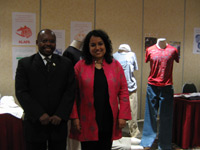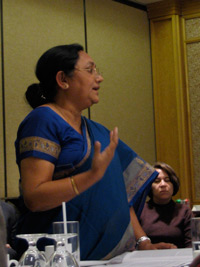WELCOME TO THE ARCHIVE (1994-2014) OF THE MAQUILA SOLIDARITY NETWORK. For current information on our ongoing work on the living wage, women's labour rights, freedom of association, corporate accountability and Bangladesh fire and safety, please visit our new website, launched in October, 2015: www.maquilasolidarity.org
May 1, 2007
On April 16-18, representatives of major international clothing brands, apparel manufacturers, governments from developing countries, trade unions, non-governmental organizations, and the International Labour Organization (ILO) came together in Toronto for the third international meeting of the MFA Forum.
MSN is one of the MFA Forum’s founding organizations and acted as the local host.
This year’s MFA Forum meetings drew a high-level delegation from the Kingdom of Lesotho. The Government of the small land-locked country is working with the MFA Forum to develop and promote its national garment industry as both globally competitive and respectful of workers’ rights.
 “Lesotho is taking the high road to competitiveness by making a serious effort to achieve and maintain compliance with international labour standards,” says Neil Kearney, General Secretary of the International Textile, Garment and Leather Workers’ Federation (ITGLWF).
“Lesotho is taking the high road to competitiveness by making a serious effort to achieve and maintain compliance with international labour standards,” says Neil Kearney, General Secretary of the International Textile, Garment and Leather Workers’ Federation (ITGLWF).
Also on hand were representatives of an MFA Forum-initiated project in Bangladesh to discuss ways of improving labour standards compliance in that country. The Bangladesh project has brought together buyers, suppliers, trade unions, NGOs and government to discuss how to improve factory monitoring, buyer purchasing practices, wages, and factory efficiency.
In a country that has experienced a significant number of worker injuries and deaths due to unsafe factories, as well as a worker uprising that paralyzed the industry one year ago during a dispute about the minimum wage, the fact that the parties are able to engage in multi-stakeholder dialogue is a hopeful sign.
 “Bangladesh has been an interesting case because it’s actually seen a growth of trade post-MFA expiry,” said Lakshmi Bhatia, Manager of Global Partnerships for Gap Inc. She notes, however, that a big part of that growth is due to the safeguards that were re-imposed on China by the US and EU. “It therefore becomes even more critical that between now and 2008 [when US safeguards on China expire] there is quick and comprehensive work done to help address some of the issues that were identified as challenges to the industry.”
“Bangladesh has been an interesting case because it’s actually seen a growth of trade post-MFA expiry,” said Lakshmi Bhatia, Manager of Global Partnerships for Gap Inc. She notes, however, that a big part of that growth is due to the safeguards that were re-imposed on China by the US and EU. “It therefore becomes even more critical that between now and 2008 [when US safeguards on China expire] there is quick and comprehensive work done to help address some of the issues that were identified as challenges to the industry.”
Recently, the Bangladesh government adopted the first minimum wage increase since 1994, but the new minimum wage is still far below a living wage for Bangladeshi workers. Bhatia sees further increases in wages as linked to a whole host of issues including purchasing practices, prices, productivity, training, and government benefits.
“We are beginning to understand how we need to be pushing all the different buttons at the same time to reach a much more holistic, sustainable approach,” says Bhatia.
Faisal Samad, Vice President of the Bangladesh Garment Manufacturers & Exporters Association, says high interest rates, high electricity bills, and low productivity restrict his members’ ability to raise wages.
“When you are doing a garment costing, the wage proportion is not a huge factor,” says Samad. “If other costs come down, yes, you can account for [wage increases].”
“If you compare a worker in China, or even in any other Asian country, and a worker in Bangladesh, productivity is about 20% less than in those countries,” say Samad. “So automatically if the productivity increases, which we are focusing on right now, yes, it would be transferred [to higher wages]. It would come without a question.”
 According to Shirin Akhter, president of the Bangladeshi women workers' organization Karmojibi Nari, Bangladeshi garment workers’ real wages have decreased significantly over the past ten years and the recent increase does not begin to make up what was lost. NGO and labour participants in the Toronto meetings emphasized that in order for workers to receive a living wage, the buyers must increase the prices they pay to their suppliers, and the suppliers must guarantee that any increase will go to workers' wages.
According to Shirin Akhter, president of the Bangladeshi women workers' organization Karmojibi Nari, Bangladeshi garment workers’ real wages have decreased significantly over the past ten years and the recent increase does not begin to make up what was lost. NGO and labour participants in the Toronto meetings emphasized that in order for workers to receive a living wage, the buyers must increase the prices they pay to their suppliers, and the suppliers must guarantee that any increase will go to workers' wages.
Also attending the MFA Forum meetings in Toronto were delegates from Mexico, Central America, Europe, and the United States.